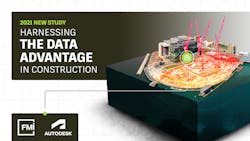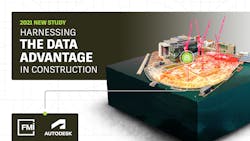Big Study: Bad Data Cost AEC Industry $1.85 Trillion in 2020
PRESS RELEASE
SAN FRANCISCO, Sept. 14, 2021 /PRNewswire/ -- Autodesk, Inc. (NASDAQ: ADSK) and management consulting firm FMI Corporation today released the results from a large new study, "Harnessing the Data Advantage in Construction," which surveyed over 3,900 professionals across the global construction industry on their data practices in 2020.
In the study, Autodesk and FMI estimate that "bad data" – data that is inaccurate, incomplete, inaccessible, inconsistent or untimely, and can't be used to derive actionable insights – may have cost the global construction industry $1.85 trillion in 2020. However, survey respondents who had strategies in place to collect, manage and analyze usable data reported benefits such as fewer project delays and budget overruns, less rework, fewer change orders and reduced safety incidents, suggesting implementing formal data strategies could enable construction teams to prevent future losses and gain competitive advantages.
"Organizations are adopting technology, but our study shows there is opportunity for them to gain even more from their investments," said Jay Bowman, research and analytics lead at FMI. "Without data strategies in place, the construction industry is leaving significant amounts of money and opportunities for more positive project outcomes on the table. The good news is that implementing data strategies is entirely within an organization's control, and our research identified a few ways some teams are successfully collecting, managing and using their data to support decision making."
Key findings from the study include:
- Bad data is leading to poor decision-making and outcomes. Thirty percent of respondents indicated that more than half of their project data is "bad" and results in poor decision making more than 50 percent of the time. Decisions made using "bad data" are estimated to have cost the industry $88.69 million in rework alone, accounting for 14 percent of all rework performed in 2020. These findings suggest construction teams and organizations need relevant, accurate and complete data sets to make consistently high-quality data-driven decisions;
- Intentional data strategies support more consistent, data-driven decision-making. The respondents who said they always incorporate project data into their decision-making (12 percent) are employing intentional data strategies to enable this, including regularly reviewing data for quality (40 percent); standardizing data collection, reporting and monitoring practices (38 percent); and structuring data in a common data environment for centralized access (38 percent);
- Data management and analysis skills are seen as critical for team success. Most respondents (60 percent) stated the presence of data management and analysis skills are important for construction teams to work effectively. When asked what project management and analysis skills will be most important for the future in the construction industry, respondents ranked workflow optimization (57 percent), data management strategy (51 percent), data analytics (47 percent), data visualization (40 percent) and data security (39 percent) as their top five skills.
"As the construction industry continues its rapid digitization, it's important to remember that the utility of technology extends beyond its immediate functions to identifying risks and opportunities with data-driven insights," said Allison Scott, director of construction thought leadership, Autodesk Construction Solutions. "This study quantifies the immense value of putting frameworks in place to capture and manage data. Organizations that implement formal data strategies stand to gain the most ROI from their technology investments, so it is important to collaborate with vendors and determine how to make the best use of the data being collected."
More materials:
- Download the full report with region-specific insights: Harnessing the Data Advantage in Construction
- Check out the Digital Builder blog for more details and an infographic;
- Listen to the findings in audiobook format;
- View the Europe report here.
About Autodesk
Autodesk is changing how the world is designed and made. Our technology spans architecture, engineering, construction, product design, manufacturing, media and entertainment, empowering innovators everywhere to solve challenges big and small. From greener buildings to smarter products to more mesmerizing blockbusters, Autodesk software helps our customers to design and make a better world for all. For more information visit autodesk.com or follow @autodesk.
Autodesk and the Autodesk logo are registered trademarks or trademarks of Autodesk, Inc., and/or its subsidiaries and/or affiliates in the USA and/or other countries. All other brand names, product names or trademarks belong to their respective holders. Autodesk reserves the right to alter product and services offerings, and specifications and pricing at any time without notice, and is not responsible for typographical or graphical errors that may appear in this document.
© 2021 Autodesk, Inc. All rights reserved.

